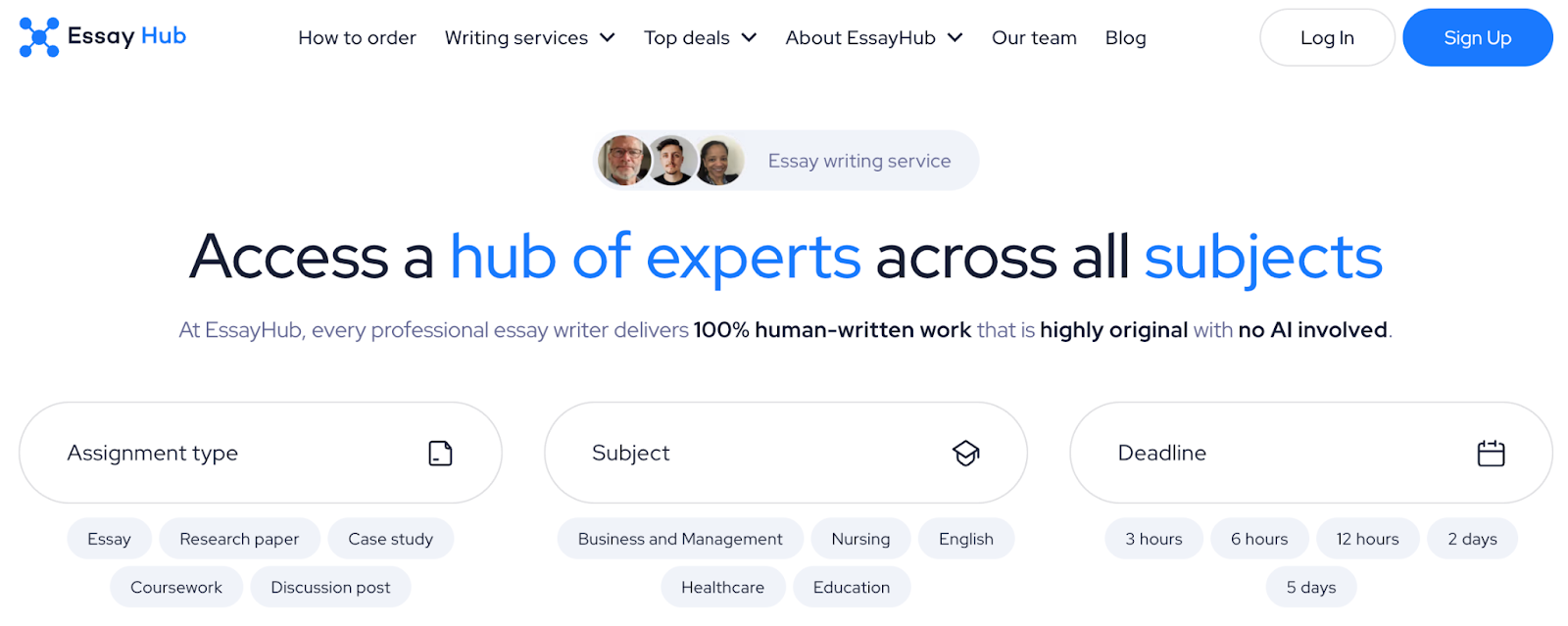Many students think the more hours they put in, the better their grades will be. But have you ever spent an entire night studying only to forget everything by morning? It’s frustrating. The truth is, studying harder doesn’t mean learning better. Cramming, endless re-reading, and obsessive highlighting might feel productive, but they don’t actually help you retain information.
The key is learning how to study effectively. Science-backed methods can help you absorb material faster and remember it longer—without sacrificing sleep or sanity.

This guide developed by EssayHub will show you practical, research-backed strategies to boost comprehension, cut study time, and make learning easier. No more last-minute panic or information overload.
Ready to level up your study game? Let’s dive into smarter, faster ways to succeed in college—no cramming required!
What’s the Best Way to Study? Find What Works for You
Ever wonder why your friend aces exams by making flashcards while you struggle to remember anything that way? That’s because everyone learns differently. The best way to study depends on how your brain absorbs information.
- As a visual learner, you can use diagrams, mind maps, and color-coded notes. Structured presentation of information accelerates comprehension.
- Auditory learners absorb the material better by listening. Try to record lectures and replay them while commuting or exercising.
- Kinesthetic learners need movement to stay engaged. Try acting out concepts, using flashcards while pacing, or making study games.
- Reading and writing learners do best with note-taking. Summarize key points in your own words, then teach someone else—it helps lock in the information.
The secret to effective studying? Find what works for you. Don’t simply mimic what other students do. Experiment with different techniques and track what helps you retain the most. The right study method makes learning easier—and way less stressful.
Study Help That Saves You Time
The right tools can make studying faster and less stressful. Sometimes, no matter how well you prepare, big assignments—especially essays—take up a huge chunk of time. That’s where study services like EssayHub come in.

EssayHub offers expert writing help, editing, and proofreading to make your academic work stronger. Whether you need an essay from scratch or just some fine-tuning, its team makes the process easier. Using services like this isn’t about taking shortcuts—it’s about working smarter.
Need more tips for studying? Pair these services with solid study habits, and you’ll see real results. The goal is to improve your academic work, not just to finish your paper faster.
Make Study Groups & AI Work for You
Studying with others can be powerful—if you do it right. Here’s how to make study groups and AI tools work for you:
- Join or create focused study groups: Keep sessions structured and goal-oriented. Avoid turning them into social hangouts.
- Use AI tools smartly: Grammarly, Notion AI, and ChatGPT can assist with writing and research but don’t rely on them completely.
- Seek academic support when needed: Professors, tutors, and online platforms can clarify tough concepts.
Want to master how to study in college? AI can help, but your brain should always be in control. Utilize these resources thoughtfully to supplement, not substitute, your learning process.
Study Skills for College Students by EssayHub
Strong study skills make college life easier. They help you retain information, manage time, and ace exams without unnecessary stress. Developing the right skills can seriously boost your grades. Make sure you work on the following:
- Critical thinking – Question ideas, dissect arguments, and go beyond memorization. This helps you truly understand the material instead of just recalling facts.
- Active reading – Underline key points, outline sections, and ask questions. Engaging with the text improves comprehension and makes studying more efficient.
- Note-taking – Employ structured methods like the Cornell Method or mind maps to organize ideas clearly. Methodical notes make revision easier.
- Test-taking techniques – Go through past exams, manage time, and use elimination techniques to boost accuracy. Understanding how to tackle various question formats helps boost accuracy and overall exam performance.
Which is an example of an effective study skill? The answer depends on what helps you retain and apply knowledge best. Try out multiple study methods and track your results to find the most effective approach.
The Secret to Success? Good Study Habits
Good study habits involve regular, structured techniques that enhance comprehension and memory. The right ones help you stay focused, manage time better, and absorb information more effectively. You need to master how to:
- Develop a learning routine – Studying at the same time each day builds consistency and makes it easier to stay on track.
- Avoid multitasking – Stay focused on a single subject during study sessions to improve retention and deepen your understanding.
- Take regular breaks – Short, structured breaks—like studying for 25 minutes followed by a 5-minute pause—help maintain focus and prevent mental fatigue.
- Improve organization – Use planners, apps, or simple to-do lists to track deadlines and plan study sessions efficiently.
Developing good study habits now will pay off in the long run. You’ll spend less time cramming, reduce stress, and improve your grades—all while keeping a balanced college life. Begin with manageable steps, stick to a routine, and see your efficiency improve over time!
Conclusion: Why Effective Study Techniques Matter in College
Studying more doesn’t always mean learning more. That’s why you need effective study techniques—they boost your efficiency and reduce stress.
Time management, active recall, and smart note-taking are game-changers. The right tools, like study planners and AI assistants, also help. Try different strategies, track what works, and refine your approach.
The key isn’t just to survive college—it’s to thrive. With the right study habits, you’ll stay ahead of deadlines and feel more confident. Learning should be productive, not exhausting. Start applying these techniques today, and you’ll see real results!







